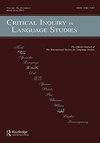“Hola, my name is Carmen, who is this?”- Language ideologies and dialect stylization in prank calls
引用次数: 1
Abstract
ABSTRACT This study discusses the dialect stylization and language ideologies involved in a nationally broadcasted radio prank show, Carmen Calls. This national prank show permits a discussion on the language practices and hegemonic ideologies involved in the media representation of the show’s Latina protagonist; Carmen Santiago De la Hoya Ruiz Rivera Perez Tú Sabes. This exaggerated radio persona utilizes various linguistic and ideological mechanisms such as mock Spanish, code-switching, and other specific dialect features to create stylistic performances of Latinx stereotypes to harass unsuspecting victims. This study considers how the framing of the radio show draws upon the current socio-historical context of the U.S. in an era of escalading anti-immigrant and, therefore, anti-bilingual sentiment to create both the persona and the prank calls themselves. The analysis shows how the pranks draw from preexisting socio-cultural profiles and repertoires to reinforce monolingualism, nationalist ideologies, and dominant discourses regarding Latinx people. By bringing into the fold dominant semiotic and values associated with Latinxs, the show is able to employ them to project the vulgar, inappropriate, and hypothetical Carmen persona that upholds mainstream discourses through the same discriminatory practices that are part of U.S. Spanish-speakers’ lived experiences as minority language users.“荷拉,我叫卡门,这是谁?”——恶作剧电话中的语言意识形态和方言风格化
摘要本研究探讨了在全国广播的恶作剧节目《卡门来电》中所涉及的方言风格化和语言意识形态。这个全国性的恶作剧节目允许讨论该节目的拉丁裔主角在媒体上的表现所涉及的语言实践和霸权意识形态;Carmen Santiago De la Hoya Ruiz Rivera Perez TúSabes。这种夸张的电台形象利用各种语言和意识形态机制,如模拟西班牙语、代码转换和其他特定的方言特征,创造拉丁裔刻板印象的风格表演,骚扰毫无戒心的受害者。这项研究考虑了广播节目的框架如何利用美国当前的社会历史背景,在这个反移民、反双语情绪不断升级的时代,创造出人物形象和恶作剧。分析表明,这些恶作剧是如何从现有的社会文化档案和剧目中汲取灵感,强化单语主义、民族主义意识形态和关于拉丁裔的主流话语的。通过将占主导地位的符号学和与拉丁裔相关的价值观融入其中,该剧能够利用它们来塑造粗俗、不恰当和假设的卡门形象,通过与美国西班牙语使用者作为少数民族语言使用者的生活经历相同的歧视性做法来维护主流话语。
本文章由计算机程序翻译,如有差异,请以英文原文为准。
求助全文
约1分钟内获得全文
求助全文
来源期刊

Critical Inquiry in Language Studies
Arts and Humanities-Language and Linguistics
CiteScore
5.30
自引率
0.00%
发文量
23
 求助内容:
求助内容: 应助结果提醒方式:
应助结果提醒方式:


